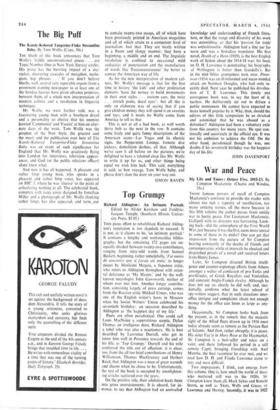Top Grumpy
Richard Aldington: An Intimate Portrait Edited by Alister Kershaw and Frederic- Jacques Temple. (Southern Illinois Univer- sity Press, $5.95.) THIS pious effort to rehabilitate Richard Aiding- ton's reputation is too slapdash to succeed. It is not, as it claims to be, 'an intimate portrait.' It contains a lengthy and workmanlike biblio- graphy, but the remaining 172 pages are un- equally divided between twenty-two contributors, ranging from sixty-odd words from Samuel
Beckett, beginning, rather unhelpfully, moms de souvenirs que si favais six mois,' to longer pieces by Morikimi Megata, a Japanese critic, who refers to Aldington throughout with orien- tal deference as 'My Master,' and by the well- known necrologist John Gawsworth, neither of whom ever met him. Another longer contribu- tion, consisting largely of press cuttings, comes from the Russian critic Mikhail Urnov, who was one of the English writer's hosts in Moscow when the Soviet Writers' Union celebrated his seventieth birthday : an occasion described by Aldington as 'the happiest day of my life.'
Poets are often paradoxical. One could call Louis MacNeice a superstitious sceptic, Dylan Thomas an irreligious deist, Richard Aldington a rebel who was also a reactionary. He is best described by Lawrence Durrell, who got to know him well in Provence towards the end of his life, as 'Top Grumpy.' Durrell and his wife conferred the title out of affection; it is clear, too, from the all too brief contributions of Henry Williamson, Thomas MacGreevey and Herbert Read, that Aldington was a man of great warmth and charm when he chose to be. Unfortunately, the rest of the book is occupied by unenlighten- ing articles scattered over the years.
On the positive side, their adulation leads them into gross overstatements. It is absurd, for in- stance, to say that Aldington had an unrivalled knowledge and understanding of French litera- ture, or that the range and diversity of his work
was astonishing, or that his 'passion for truth' was unfashionable. Aldington had a fine ear for verse and was a first-class translator. His first novel, Death of a Hero (1929), is the best English work of fiction about the 1914-18 war; his book on D. H. Lawrence is penetrating; his biography of Wellington is better than Guedalla's. But in the mid-'fifties grumpiness took over. Pinor- man (1954) was an ill-informed and mean-minded attack on Norman Douglas, who had only re- cently died. Next year he published his devalua- tion of T. E. Lawrence. This timely and courageous book was, to say the least of it, tactless. He deliberately get out to deface a public monument. He cannot have expected to make himself popular by it. Why, then, should the editors of this little symposium be so shocked and astonished that he was abused as a debunker? Aldington had been a voluntary exile from this country for many years. He spat con- tinually and accurately in the official eye. It was not his ambition to achieve the OM. On the other hand, paradoxical though he was, one doubts if his seventieth birthday was the happiest day of his life.
JOHN DAVENPORT


































 Previous page
Previous page